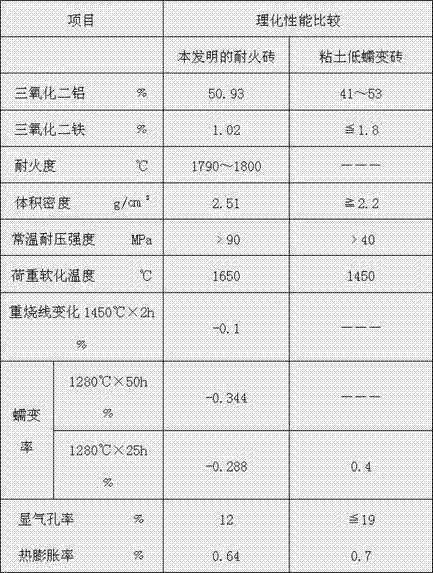Refractory bricks for flue walls of carbon anode baking furnaces and preparation method thereof
A carbon anode and refractory brick technology, which is applied in the field of roasting furnaces, can solve the problems of low porosity of refractory bricks, high softening temperature under load, and low creep rate at high temperature, and achieve high softening temperature under load, stable volume at high temperature, and high temperature creep low rate effect
- Summary
- Abstract
- Description
- Claims
- Application Information
AI Technical Summary
Problems solved by technology
Method used
Image
Examples
Embodiment 1
[0018] 1. After the calcined kaolin is crushed, it is screened into two grades with a particle size of 3-1mm and 1-0mm;
[0019] 2. After mixing 20% sillimanite, 15% alumina powder and 10% bonded clay, grind it into a co-milled powder with a fineness of ≦0.088㎜;
[0020] 3. Mix the co-milled powder with 38% of calcined kaolin of 3-1mm grade and 17% of calcined kaolin of 1-0mm grade according to the above ratio, and add pulp waste liquid and mix together for 10-15 minutes;
[0021] 4. The mixed mud is pressed and formed into adobe, dried at 80-160°C, put into a tunnel kiln, and calcined at 1480-1500°C to make a refractory material;
[0022] 5. Press molding, use 315T pneumatic press to press the mud to a density of ﹥2.55g / ㎝ 3 of adobe.
Embodiment 2
[0024] 1. After the calcined kaolin is crushed, it is screened into two grades with a particle size of 3-1mm and 1-0mm;
[0025] 2. After mixing 25% sillimanite, 8% alumina powder and 12% bonded clay, grind it into a co-milled powder with a fineness of ≦0.088㎜;
[0026] 3. Mix the co-milled powder with 30% of calcined kaolin of 3-1mm grade and 23% of calcined kaolin of 1-0mm grade according to the above ratio, and add pulp waste liquid and mix together for 10-15 minutes;
[0027] 4. The mixed mud is pressed and formed into adobe, dried at 80-160°C, put into a tunnel kiln, and calcined at 1480-1500°C to make a refractory material;
[0028] 5. Press molding, use 315T pneumatic press to press the mud to a density of ﹥2.55g / ㎝ 3 of adobe.
Embodiment 3
[0030] 1. After the calcined kaolin is crushed, it is screened into two grades with a particle size of 3-1mm and 1-0mm;
[0031] 2. After mixing 23% sillimanite, 13% alumina powder and 8% bonded clay, grind it into a co-milled powder with a fineness of ≦0.088㎜;
[0032] 3. Mix the co-milled powder with 35% of calcined kaolin of 3-1mm grade and 21% of calcined kaolin of 1-0mm grade according to the above ratio, and add pulp waste liquid and mix together for 10-15 minutes;
[0033] 4. The mixed mud is pressed and formed into adobe, dried at 80-160°C, put into a tunnel kiln, and calcined at 1480-1500°C to make a refractory material;
[0034] 5. Press molding, use 315T pneumatic press to press the mud to a density of ﹥2.55g / ㎝ 3 of adobe.
[0035] The physical and chemical properties of the special brick for the flue wall of the carbon roasting furnace of the present invention are compared with refractory bricks and high-alumina bricks, as shown in Table 1
[0036] Table I
[0...
PUM
| Property | Measurement | Unit |
|---|---|---|
| particle size | aaaaa | aaaaa |
| particle diameter | aaaaa | aaaaa |
Abstract
Description
Claims
Application Information
 Login to View More
Login to View More - R&D
- Intellectual Property
- Life Sciences
- Materials
- Tech Scout
- Unparalleled Data Quality
- Higher Quality Content
- 60% Fewer Hallucinations
Browse by: Latest US Patents, China's latest patents, Technical Efficacy Thesaurus, Application Domain, Technology Topic, Popular Technical Reports.
© 2025 PatSnap. All rights reserved.Legal|Privacy policy|Modern Slavery Act Transparency Statement|Sitemap|About US| Contact US: help@patsnap.com

